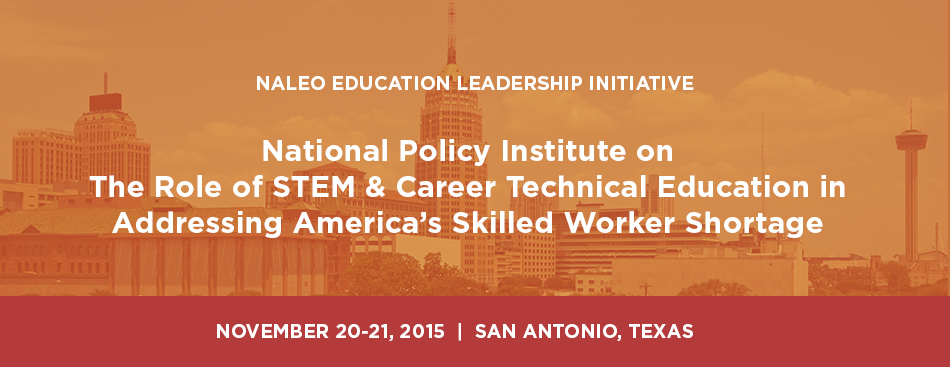
About
November 20-21, 2015 | San Antonio, TX
The 21st Century global job market requires workers that are equipped with skills and knowledge in Science, Technology, Engineering and Math (STEM) disciplines. These skills are essential and increasingly required not just for science and tech jobs, but for all occupations and in communities that are seeking to attract large employers in information technology, energy and advanced manufacturing among others.
Experts agree that a key strategy for filling the skills gap is to introduce STEM careers early in the K-12 system and provide students with the opportunity for hands-on learning experiences so that they see the real-life applications of STEM fields. However, this strategy alone will not be sufficient to maintain our nation’s competitiveness and economic prosperity. It is also critical to ensure the ongoing training and development of those already in the workforce. Addressing these challenges will only be possible if private-sector efforts are coupled with public-sector investments in order to address skills shortages and the lack of diversity in STEM disciplines. As researchers, advocates, major foundations, and policy leaders continue to collectively set ambitious goals to increase the number of students interested and enrolled in STEM pathways, policymakers can play a leadership role in promoting and working to embed a STEM culture in the education and workforce continuum.
In order the support the leadership role of Latino policymakers in STEM, the Institute’s curriculum will cover:
-
- Defining the Needs of the Current and Future Workforce
- The Role of Apprenticeships
- The Education & Job Skills Development Needs of Non-traditional Students
- Next Generation Science Standards and College Readiness
- Student Engagement
- Policy Lessons Learned
- A New Blueprint for Post-Secondary Education
The Policy Institute will convene state legislators, local policymakers, national and state experts, private sector representatives, and other relevant stakeholders. Participants will have an opportunity to discuss and develop strategic collaborations for addressing the challenges and opportunities around STEM and workforce issues. Policymakers will receive information on the latest research, studies and best practices; exchange legislative policies and ideas; strengthen governance skills that support effective leadership; and have the opportunity to network with colleagues and experts from throughout the country.
Sponsors
Presenting Sponsor
Bill & Melinda Gates Foundation
Investor Partners
Pacific Gas and Electric Company
Toyota
Schedule
- Friday, November 20
- Saturday, November 21
7:00 a.m. – 8:00 a.m.
Registration and Breakfast
8:00 a.m. – 12:00 p.m.
Mobile Learning Tour
• Visit T-Stem Academy
• Visit Alamo Colleges Advanced Manufacturing Technology Program
11:30 a.m. – 12:30 p.m.
Networking Lunch
1:00 p.m. – 2:30 p.m.
Session I:
Defining Current & Future U.S. Workforce Needs
Latinos are an increasingly vital part of the national economy and the fastest growing segment of the United States population. Although, they have high participation rates in the labor force and enter the workforce at an early age, they tend to be employed in jobs that pay low wages and provide low economic mobility. Since many Latinos lack the education and work experience that brings about better paying opportunities, focusing on an education and workforce policy agenda that will enhance their technical and academic skills is a national priority. This session will present a snapshot of the current and future workforce needs necessary to enhance the competitiveness of America’s workforce.
• Mr. David Crouch, Vice President of Administration, Toyota Motor Manufacturing, Texas, Inc.
• Mr. David E. Marquez, Executive Director, Bexar County Economic Development Department, Texas
PRESENTATION
2:30 p.m. – 3:30 p.m.
Session II:
Policy & Practice: The Role of Apprenticeships in Developing a Highly Skilled Workforce
Projections of employment opportunities show great need for skilled workers in the United States. Organizations, labor, and governments alike are working together to address the skills labor gap in public K-12 education and higher education by promoting apprenticeships as a model to meet the current changes in the workforce. Students have become engaged in these apprenticeships by being assured of a secure future and a good standard of living since their training will be in job sectors and markets where their skills will be in high demand. Participants in this session will have an opportunity to identify effective policies and system wide initiatives that promote the successful development of apprenticeships with an emphasis on hands-on learning and an increase in student engagement, interest, and achievement.
• Mr. Steven D. Opitz, Regional Director, Office of Apprenticeship, U.S. Department of Labor
PRESENTATION
• Dr. Federico Zaragoza, Vice Chancellor of Economic and Workforce Development, Alamo Community College District
• Mr. James Morante, Talent Pipeline Development, Pacific Gas & Electric Company
3:30 p.m. – 4:45 p.m.
Session III:
Addressing the Needs of the Non-traditional Student: A Framework to Support our Current Workforce
Our current workforce is represented by unique population segments, such as military personnel and veterans, immigrant workers, independent contractors, in addition to individuals who are already in the workforce but who need to enroll in postsecondary or technical education programs to enhance their workforce development needs. Sectors of the workforce, in collaboration with communities and postsecondary institutions have been able to develop programs tailored to meet the needs and characteristics of these unique groups. This session will highlight policies and programs designed to facilitate the success of diverse workers in order to enhance their technical skills and to support their transition into increased training, certification, or attainment of market valuable postsecondary degrees.
• Ms. Margie McHugh, Director, National Center on Immigrant Integration Policy, Migration Policy Center
• Mr. Gardner Carrick, Vice President of Strategic Initiatives, The Manufacturing Institute
5:00 p.m. – 7:00 p.m.